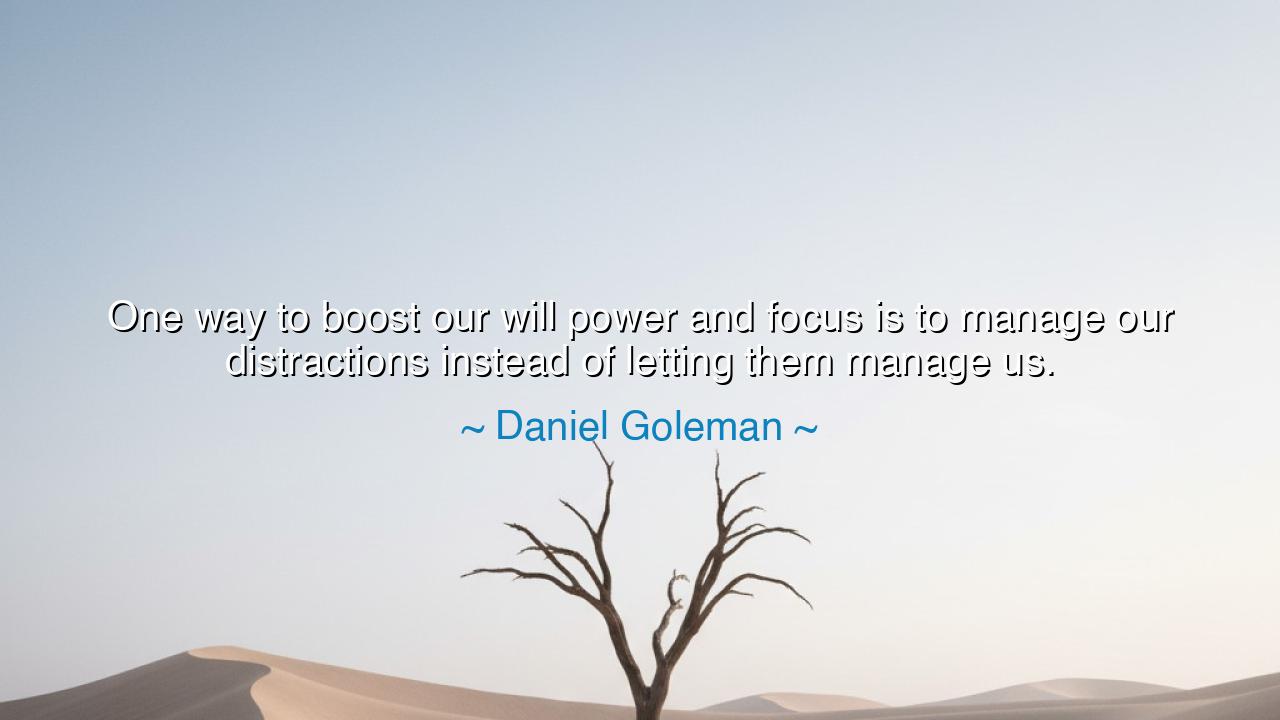
One way to boost our will power and focus is to manage our
One way to boost our will power and focus is to manage our distractions instead of letting them manage us.






Hearken, O children of the ages, to the teachings of Daniel Goleman, who speaks of the inner forge where willpower and focus are wrought. He declares that the strength of the soul is not merely in desire, but in the mastery of distractions. When the mind is led astray by the clamors of the world, its power wanes; yet when one manages distractions with wisdom, the spirit rises to clarity, and every action becomes deliberate, potent, and true.
Goleman reminds us that the battle is not only with external foes, but with the ceaseless currents that pull upon attention and resolve. Distractions, if left unchecked, govern the will, scattering energy and weakening intent. To seize mastery over them is to reclaim the throne of the mind, to sharpen the faculties of judgment, and to awaken the latent power within to act with purpose and perseverance.
Consider the life of Leonardo da Vinci, whose extraordinary achievements arose not from mere genius alone, but from a disciplined engagement with his craft. Amid the temptations of idle pursuits and the interruptions of daily life, he cultivated an inner dominion, focusing his attention with precision upon painting, engineering, and invention. In this careful management of distractions, he transformed thought into enduring achievement, embodying Goleman’s teaching across the centuries.
Even in the humbler spheres of life, this truth resonates. The artisan, the scholar, the soldier, each who bends the mind to mastery over interruptions strengthens the sinews of will. To allow external allurements to govern one’s purpose is to scatter the essence of being; to govern them is to direct life toward excellence, wisdom, and lasting fulfillment. Each moment reclaimed from distraction is a jewel of triumph, a testament to the sovereignty of reason over chaos.
O children of the future, carry this teaching in your hearts: do not let your mind wander aimlessly in the tides of distraction, nor allow trivialities to govern your spirit. Let the deliberate act of managing distractions be your shield and your sword, empowering your will, sharpening your focus, and guiding your hand in all endeavors. In this vigilance lies the path to mastery, the cultivation of power, and the flowering of human potential.
If you desire, I can also craft a visual, ancient scroll-style presentation of this passage to capture the heroic and timeless resonance of Goleman’s teaching on willpower, focus, and the mastery of distractions.






GDGold D.dragon
I like the idea of taking control over distractions rather than letting them dictate our actions, but I also wonder: is this concept harder to apply in today’s fast-paced world, where distractions seem to multiply by the minute? Is it realistic to expect people to fully eliminate or manage every distraction, especially in high-pressure environments? How can we learn to cope with distractions without feeling overwhelmed or guilty for getting off track?
NKHoang Nhat Khang
This quote speaks to a struggle I’ve been facing lately — with so many distractions in our modern world, staying focused is a constant battle. I wonder, though, is it possible to train ourselves to avoid distractions completely? Or is the real issue that our brains are just naturally wired to jump from task to task? Maybe the key isn’t eliminating distractions, but learning to pivot back to focus when we’re sidetracked.
GDGold D.dragon
I really appreciate Goleman’s point about managing distractions, but I think there’s also the issue of what truly qualifies as a distraction. Sometimes, what seems like a distraction could be an important creative or reflective pause. How do we differentiate between productive breaks and true distractions that derail us? It seems like it’s not just about cutting out interruptions, but learning to recognize what supports our well-being and creativity.
DDan
This perspective on managing distractions instead of letting them manage us is so relevant in today’s world of constant notifications and multitasking. But I wonder, can the constant need for focus lead to burnout or frustration? How do we know when to push ourselves to stay focused and when to allow for breaks or mental rest? It seems like finding that balance is key, but how do we avoid feeling guilty when we take a step back?
NONguyen Oanh
This quote resonates with me because distractions can really derail productivity and focus. But I wonder, is it possible to truly 'manage' distractions, or do they just need to be minimized or avoided? How do we find the balance between being productive and still allowing space for relaxation or spontaneity? Sometimes, it feels like distractions are an inevitable part of life — is it about managing expectations instead of just cutting them out?